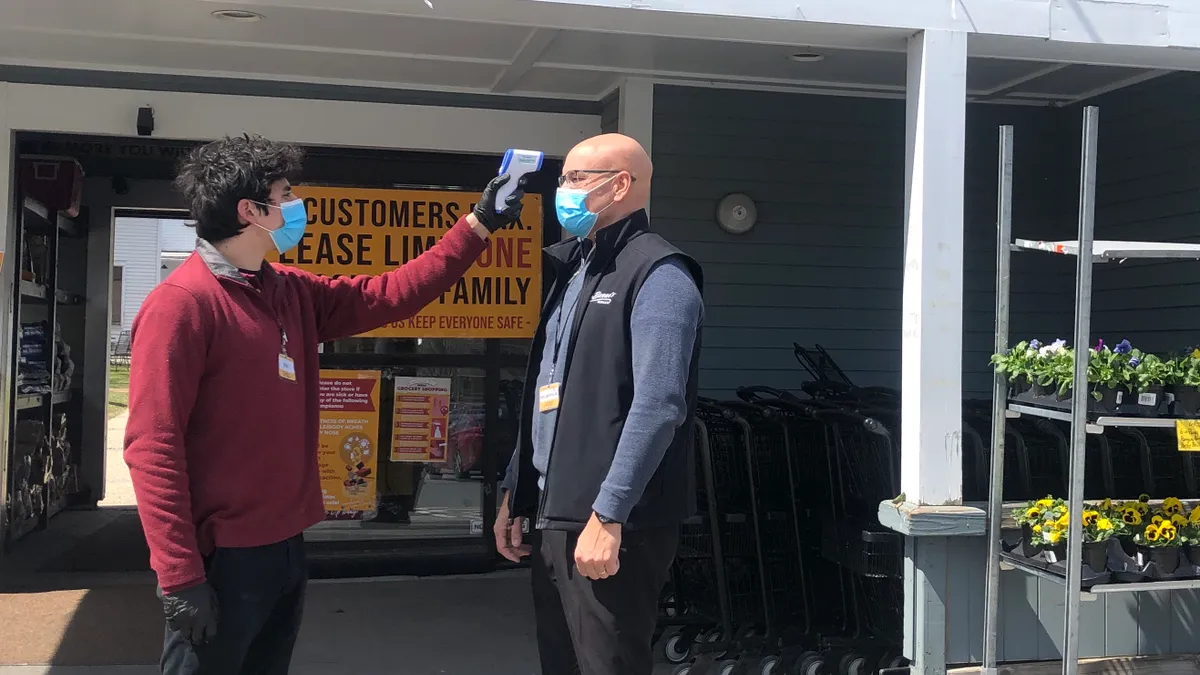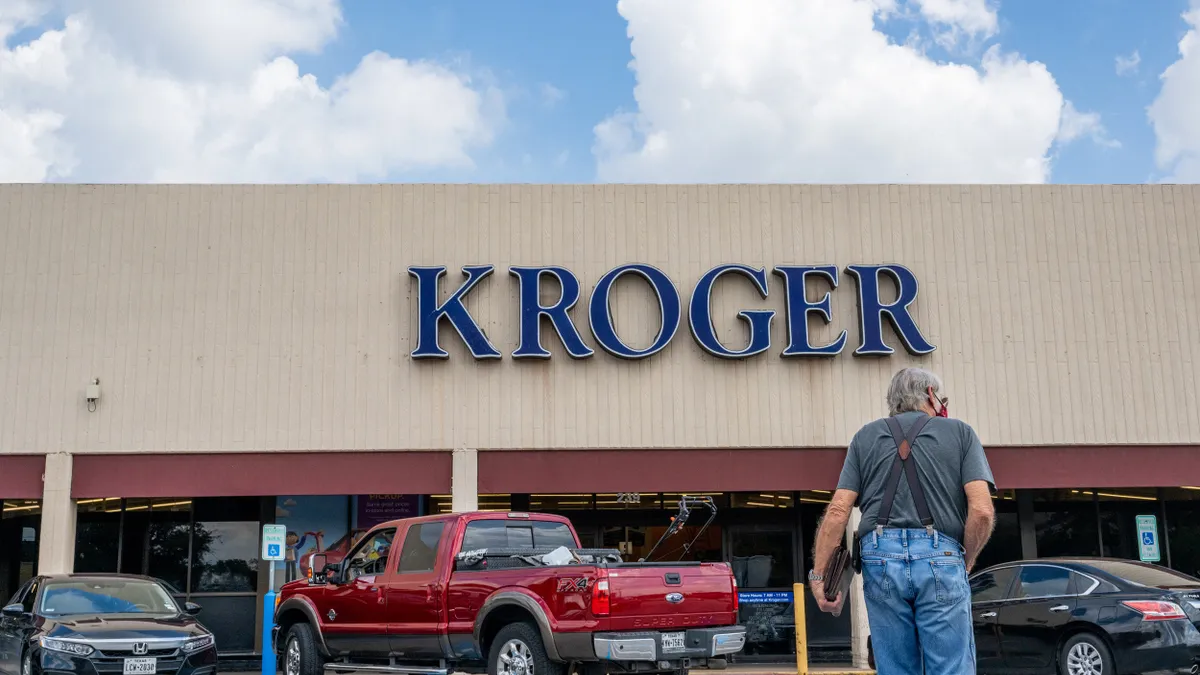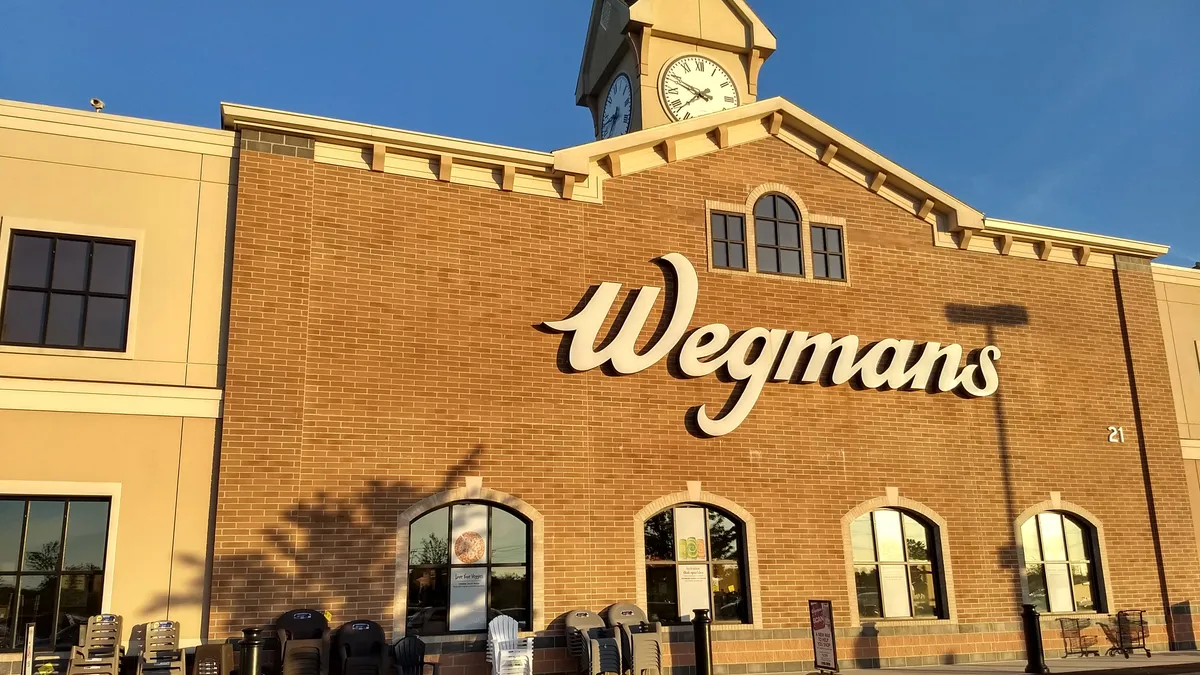Armed with eight handheld thermometers, a healthy dose of optimism and the determination to keep the novel coronavirus from invading his grocery stores, Bob LaBonne Jr. has found himself out in front of a supermarket industry navigating an escalating pandemic.
LaBonne’s four Connecticut grocery stores, located not far from hard-hit New York City, are among a handful of supermarkets in the United States that have started screening customers for fevers. While other grocery companies may be waiting for official guidance on whether such a step is necessary or even advisable, LaBonne said he had no hesitation about taking people’s temperatures before letting them in.
“There is no playbook for how to run a grocery store in a pandemic,” the president and CEO of LaBonne’s Markets told Grocery Dive. “I wake up and ask myself several times a day what else can I do to keep my people, their families, and my customers and communities safe.”
Workers at LaBonne’s Markets began checking the temperature of every customer on April 7, the day after LaBonne received the thermometers, which measure body temperature without having to touch the skin. Anybody registering a temperature of 100.4 degrees Fahrenheit or above, employees and vendors included, is barred from entering, with no exceptions, he said.
LaBonne noted that the company has been highlighting its curbside pickup and home delivery options to customers and is putting a 40-foot container with refrigerated space and an office outside his company’s store in Salisbury, Connecticut, where he said business has tripled due to an influx of New Yorkers escaping the city.
LaBonne said he bought the thermometers on Amazon for less than $100 each.
“I personally went around to each store and explained what I wanted and what to say,” LaBonne said. “Again, it’s not an option. It’s not, 'Can I take your temperature?' It’s, 'Excuse me, but I have to take your temperature.' So far, it has not been an issue.”
“There is no playbook for how to run a grocery store in a pandemic. I wake up and ask myself several times a day what else can I do to keep my people, their families, and my customers and communities safe.”

Bob LaBonne Jr.
President and CEO, LaBonne's Markets
LaBonne said a few shoppers have reacted negatively to the temperature screenings, including one who bristled at the fact that LaBonne’s Markets started the temperature checks a day ahead of when LaBonne had announced on Facebook that they would begin.
“I’m having people that are chiming in online saying this is a false sense of security,” he said. “That’s true. People can be asymptomatic, but if someone does have a fever and the test says they have it, it’s one less person that can walk around and potentially infect another customer or one of my associates. It’s not 100%, but it’s more than my competition is doing, that’s for sure.”
LaBonne requires all of his more than 400 employees to wear face masks, which he provides, but has so far refrained from making face coverings mandatory for shoppers. “If I had them to give out I would give them out, but they’re in short supply, and I want to be sure that the medical people have them," he said. "So we’re just encouraging it right now.”
'That's not for us to solve'
Major retailers, including Walmart and Amazon, have begun checking employees' temperatures and asking those with fevers to stay home. Grocers around the country have also installed barriers at checkouts, limited store capacity, encouraged people to practice social distancing and taken other steps to slow the virus.
But performing customer health screenings introduces a variety of privacy and procedural issues.
“That obviously is a step into a whole realm of public policy privacy issues that would have to come with clear guidance from the government,” Dan Bartlett, Walmart's executive vice president of corporate affairs, said during a recent call with reporters. “That's not for us to solve, in my opinion.”
Hy-Vee, which has taken steps to protect customers and employees such as setting aside shopping hours for seniors, installing shields at checkout counters, implementing one-way aisles and banning reusable bags, follows guidance from public health authorities, spokeswoman Christina Gayman told Grocery Dive.
“We follow all guidance from the CDC and health officials. We also are following all federal, state and local requirements," she wrote in an email. "At this time, those measures do not include checking customers for fevers. However, if that changes then we will immediately follow their guidance."
The CDC currently advises anyone with a fever or who isn't feeling well to stay home, and for anyone who has been diagnosed with COVID-19 or come into close contact with someone who has the virus to self-quarantine for two weeks.
Grocery foot traffic has moderated in recent weeks following a mid-March surge in panic buying, making it easier for retailers to control customer inflow. But telling customers they can't enter stores, and then actually enforcing the rule without putting employees and others in danger, could be challenging.
“Checking the temperatures of shoppers would help protect both grocery workers and shoppers, but it's likely that not all shoppers would agree to this,” John Logan, professor and director of labor and employment studies at San Francisco State University, told CNN.
These hurdles haven't deterred LaBonne's and a handful of other small operators. City Farmers Market, which operates six stores in Georgia, began in March using sensors that remotely beam the temperature of each shopper to a screen as they walk by, a manager at one of the company’s stores told Grocery Dive. If someone appears to have a fever, a store employee will take the person aside and perform another check using a handheld thermometer. Store personnel will offer to bring groceries to anyone told they cannot enter the store, the manager, who asked to remain anonymous, said.
Menards, a Midwestern home improvement chain that carries a limited selection of groceries, started checking the temperature of customers at a store in Eau Claire, Wisconsin, on April 1 using a handheld thermometer that does not need to touch a person’s skin to work, spokesman Jeff Abbott said in a statement to Grocery Dive.
“We’ll start doing temperature checks in all of our stores as soon as we can get infrared thermometers to them," he said. "If anyone has any of these thermometers, please help us out on this.”
LaBonne said he was spurred into action after his wife, a nurse, said the hospital where she works was taking people’s temperatures before entering. “I said, 'I have even more people coming to my stores, and they’re not allowing any visitors in the hospital, so I should do it [as well],'" he said. “I had a heart attack years ago, and asthma, so I have two high-risk factors, but I’m here every day going to work.”
LaBonne said he is hopeful that people who are told they can’t enter his stores will seek medical attention instead of getting upset. He said he has no regrets about instituting the temperature checks at his stores.
“I’m hoping the whole process of checking temperature raises the awareness of hey, if you’re sick, stay home, go see a doctor, take proper steps,” LaBonne said. “There are people that said they’ll never shop in my store again, but that’s their choice. We’re a private business on private property, and in the end I’m going to do everything, and knock on wood, we don’t have [any workers] sick, and we want it to stay that way.”





















